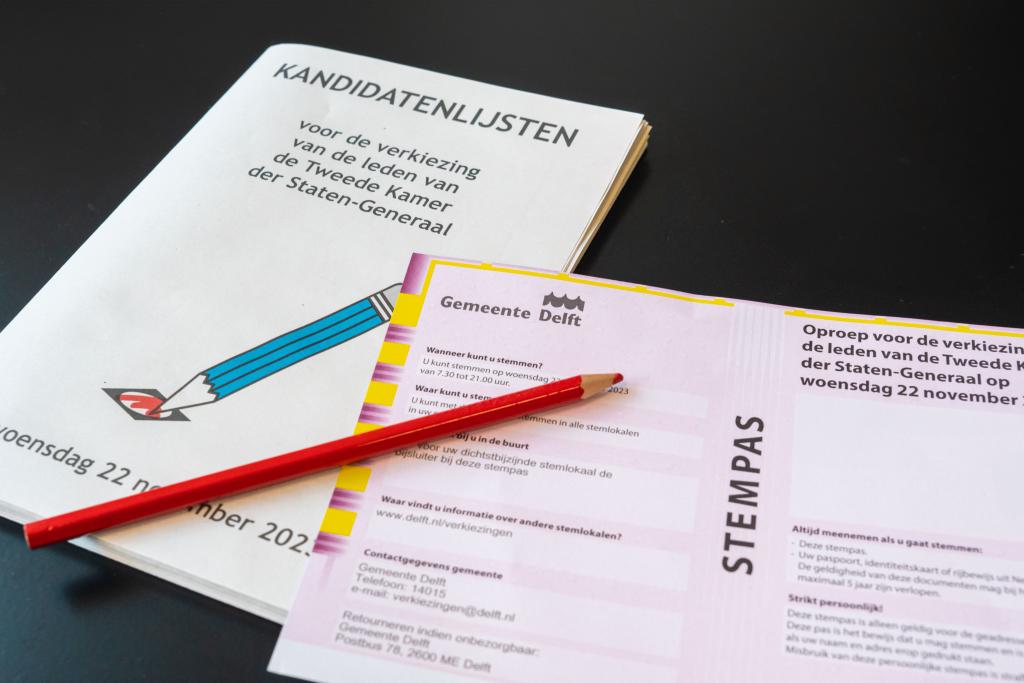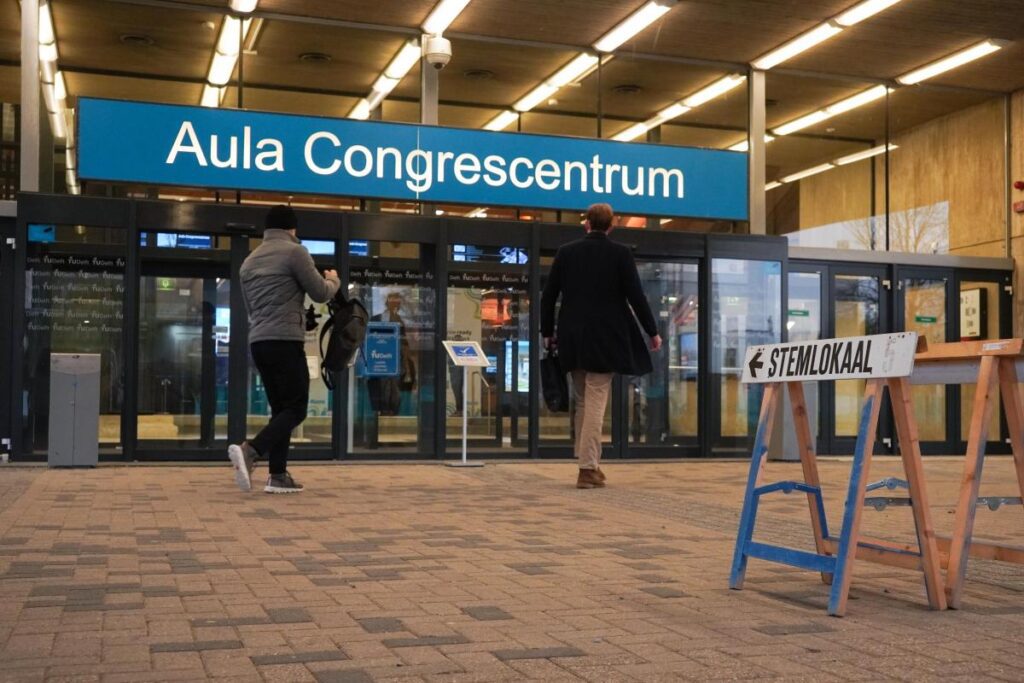If it were up to TU Delft students and employees, GroenLinks/PvdA would be the biggest political party. Climate and housing were the most important themes in Delta’s survey.
The polling station in the TU Delft Aula will be open between 7.30am and 9pm on 22 November. (Photos: Thijs van Reeuwijk)
Two hundred and eighty-five students and 81 employees took the online survey, which was run from 15 to 19 November. Of the respondents who are eligible to vote, 76% said they had decided which party or even which candidate to vote for.
Among the students, GroenLinks/PvdA was the favourite with 38% of the votes, followed by Volt (13%) and VVD (10%). The employees too opted for GroenLinks/PvdA (36%), followed by VVD (10%), Partij voor de Dieren (10%) and Volt (8%).
Climate and housing
Almost 15% of the respondents had narrowed down their choice to two or more parties. Among these undecided voters, GroenLinks/PvdA (24%), Volt (20%), and Partij voor de Dieren (16%) were the parties most named.
This is also reflected in the survey results. Climate and housing are the most important issues. Higher education, Europe and financial security less so. Other themes mentioned were decolonisation, compensation for unlucky students, polarisation and the situation in the Middle East.
‘Every individual has the right to personal support to be able to function well in society. This is why I believe financial security and good education are extra important’, one employee wrote to explain their choice. ‘The climate is our biggest problem at the global scale and given the geopolitical tensions, I believe that it is of great importance to make Europe stronger.’
‘I believe financial security and good education are extra important’
Another aspect that stood out is that several respondents are opting to vote strategically. ‘My political preference is the SP, but I will vote GroenLinks/PvdA purely because analysis shows that they have the biggest chance of beating the VVD’, says one student.
One respondent said that they would not vote. The reason was not given.
Not eligible to vote
You need to be eligible to vote to vote in the House of Representatives elections. You then need to have Dutch nationality, be 18 years or older, and not barred from having the right to vote (in Dutch). The CBS (Statistics Netherlands) estimates that 13.3 million residents have the right to vote in these elections. In Delft, 81.4% of adults may vote.

Voting pass for the House of Representatives elections (Photo: Thijs van Reeuwijk)
International students and staff are not allowed to go to the voting booth. What if they could? Twenty-nine students and staff members cast pretend votes in the survey. Most of them also went for GroenLinks/PvdA (31%) followed by D66 (12%) and Volt (12%). The decisive themes for this group were climate, housing, Europe and nuclear energy.
We will only know whether the survey is representative for the rest of the Netherlands after Wednesday 22 November when all the votes are counted. The Delta survey (in Dutch) for the House of Representatives elections in 2021 turned out to be representative for how people in Delft voted. Almost 20% of people at TU Delft voted for D66, the party that ultimately won the most votes in the Municipality of Delft (21.7%). Then too climate was the most important theme.
Votes can be cast between 07:30 and 21:00 at 52 locations in Delft. This year there are special polling stations in the Virgiel club building, the Nieuwe Kerk, the City Hall on the Markt, and the Aula on TU Delft’s campus.
Accountability
Three hundred and sixty-six students and staff members filled in Delta’s election survey between 15 and 19 November. Of them, 285 are students, 35 support staff members, and 46 academic staff members associated with TU Delft. Three hundred and thirty-seven of them are eligible to vote.
The respondents were asked if they had decided who to vote for and for which party; if they were still undecided, and if so between which parties; and, which themes were important in taking a decision.
The respondents were approached through various digital channels: our website, X, LinkedIn, Facebook and Instagram. This does imply though that only the students and staff members who are interested in politics filled in the questionnaire. The questionnaire was also accessible for people outside TU Delft. This means that people from outside TU Delft may also have filled it in.
The sample serves as a representative reflection of around 27,000 TU Delft students and 8,000 staff members. To get a reliability rate of at least 90% and a margin of error of 5%, 271 filled in questionnaires are needed. With 337 people at TU Delft who have voting rights filling in the questionnaire, the survey meets this requirement. If we break this down to students and staff, the poll is not representative in the latter case.
Do you have a question or comment about this article?
m.vanderveldt@tudelft.nl


Comments are closed.